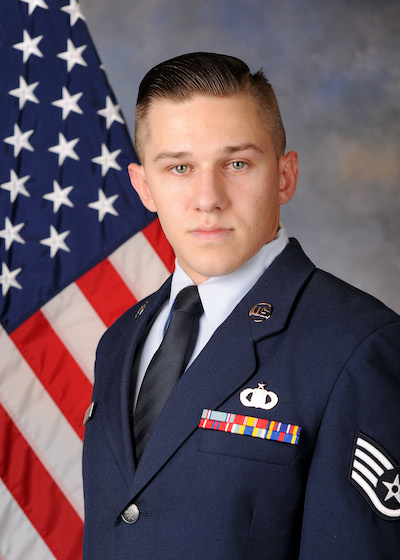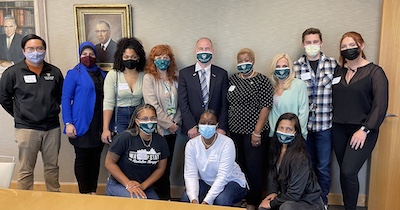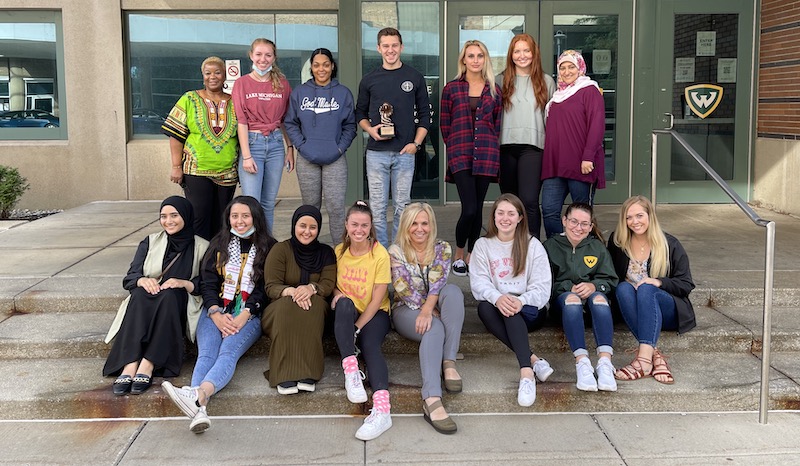Veterans Day Q&A with Radiation Therapy Technology student Trever Henderson
Q: In which branch of the military did you serve, during which years, and what was your final rank?
A: I served in the Air Force from 2013 to 2019; my final rank was Staff Sergeant. The base command post is the central command point for mission operations. It's the job of Command Post specialists to ensure operations and communications run efficiently and effectively under any circumstance. Tasks vary from base to base depending on the resources needed and utilized. These cool-headed professionals provide essential skills and knowledge to keep the base and our missions running smoothly.
Q: Why did you decide to serve?
A: I decided to serve to give back to our nation, and as a means to put myself through college after I completed my enlistment contract.
Q: Did you know you wanted to go into health care when you enlisted or did something happen during your service that pointed you toward that career path?
A: I knew that I wanted to be in the medical field ever since my best friend passed away from cancer when I was 16.
Q: How do you feel your military career informs or affects your health care career?
A: I feel as if my experience in the military positively affects my career in the health care industry because I have a very high level of attention to detail. I am able to operate under stressful circumstances with ease, I have discipline to listen and follow directions as well!
Q: What five words best describe you?
A: Honest, Hardworking, Analytical, Disciplined, Caring
Q: What do you like to do in your free time?
A: I like to spend time with my family. That consists of playing Mario Party, Mario Kart, Super Smash Bros. and other family-friendly games with my daughter and wife. When I'm not spending time with my family I am either working on maintaining my house, whether it be outside or inside, or tinkering with my car and fixing it up.
Q: Why did you choose Wayne State University?

A: I did research to see which college offered Radiation Therapy Technology as a professional program. Once I saw that WSU was ranked 6th in the nation for its RTT program, I knew that I wanted to attend. Additionally, the college is relatively close to where I live.
Q: Why did you choose your field?
A: I chose Radiation Therapy Technology because when I was 16-17, my best friend ended up dying from lung cancer. He lost around 100 pounds throughout the course of his treatment; eventually, the cancer went metastatic and spread to his brain. He ended up going blind, deaf and losing his sense of taste before dying. It was a truly disheartening experience and I wanted to do what I could to help others who were diagnosed with cancer. Every patient I see when doing my clinical rotations reminds me of my deceased best friend.
Q: Tell us about a classroom, lab or clinical experience that you enjoyed.
A: I thoroughly enjoyed my clinical rotations through Henry Ford Detroit. The full-time therapists who were teaching the students were incredibly helpful, professional and knowledgeable on everything that they were doing. Not to mention all of the equipment at Henry Ford Detroit is brand new so working with cutting-edge technology is a pleasure.

Q: If you had 24 hours free from work and school obligations, how would you spend your day?
A: I would spend my day with my wife, daughter and son relaxing, enjoying their company.
Q: Share a recent accomplishment that made you proud of yourself.
A: I'm very proud of the fact that I completed all of my prerequisites for the RTT professional program with a 3.95 GPA and am currently maintaining a 4.0 GPA. During my tenure in the military, I am proud of the fact that I earned multiple awards and attained the rank of Staff Sergeant.
Q: What are your career aspirations?
A: I aspire to become a dosimetrist after completing the Radiation Therapy Technology professional program.
Read more in our Veterans Day Q&A series.
Radiation therapists have a unique opportunity to blend the knowledge and skills of mathematics, science and psychology in their daily work. Radiation therapists operate sophisticated radiation equipment to treat malignant tissue, assist in designing cancer treatment through the use of 3D computer-generated calculations, recognize when a patient is having additional medical problems that require a doctor's attention and provide psychological support for patients who are dealing with the stress of their illness. The bachelor of science in Radiation Therapy Technology is offered through Wayne State's Eugene Applebaum College of Pharmacy and Health Sciences with an application deadline of Nov. 30.